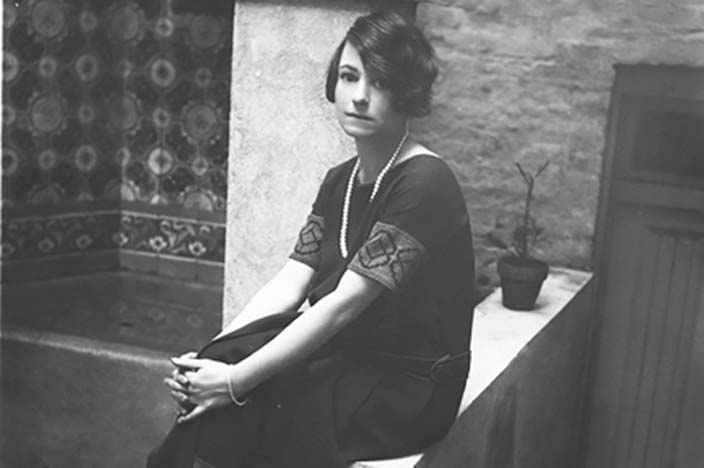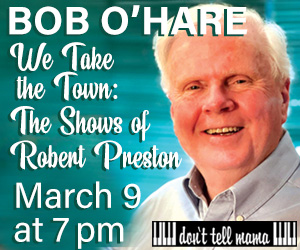By Alix Cohen
“Dotty had a mind like a steel trap- and a tongue to match.” Robert Benchley
Dorothy Parker (1893-1967) was a poet, short story writer, screenwriter, critic, and satirist known for sharp wit and acute, unapologetic observations of social life. In the 1920s, she was one of a few women at the fabled Algonquin Round Table where writers, publishers and actors cross pollinated and dished.
Varied formats dealt with love, betrayal, and existential despair, reflecting her own tumultuous life. The artist suffered severe alcoholism and repeatedly attempted suicide, dying of neither.
Playwright Douglas Carter Beane’s theatrical anthology of Dorothy Parker’s work is presented by Julie Halston, Ann Harada, Jackie Hoffman and Anika Larsen, who predominantly read from behind music stands. One singular scene, a highlight, finds Larsen moved to the venue bar. The actress practically conjures both a speakeasy and husband, Fred, cowed by her side. Larsen’s contributions throughout are understated, sometimes replete with accent, all in clear character.
“The portable Dorothy Parker is 614 pages. Since when is that portable?” quips Hoffman. Her frequent theater persona lends itself perfectly to Parker’s Eyore-like deadpan. Timing is pitch perfect.
Material arrives under subject headings called “File Tapes” such as Booze, Random People Worth Hating, Artists and Poets, Drama Critics. Short scenes are performed between epigrams and limericks. During one sequence, between poems, the ladies rise and do minimal, interpretive dance, each on her own axis. Facial expressions exemplify the author’s sardonic attitude.

Ann Harada, Julie Halston, Anika Larsen, Jackie Hoffman- Photo by David Lawrence
Julie Halston plays an exaggerated Bitsy von Muffling-type (her character in Sex and the City’s sequel, And Just Like That.) While socialite Bitsy is oblivious to her prejudices and priorities, this personification is histrionic about them. Gestures are fitting, the comedienne knows when to pause or glare, but heightened level of upset (and volume) diminishes Parker’s wry point of view.
“It couldn’t have been more thrilling” and “I couldn’t be more famous” recall lyrics from Noel Coward’s “I Went to a Marvelous Party.” Satin bows at the actresses’ wrists represent Parker waking in hospital, asking her milliner to bring bright ribbons ostensibly to contrast events. An inspired visual.
“Sometimes I get so nauseated, I could just yip!…Sylvie Eaton can’t go to the door unless she’s had a hypodermic…Joe left word he was going to the country this afternoon. He couldn’t stoop to say which country!… You mean those clothes of hers are intentional?! My heavens, I always thought she was caught leaving a burning building!” (Parker)
“Dorothy’s wit was never cruel. It was surgical.” (Edna Ferber)
Excerpts of two songs with lyrics by Parker are performed. (Brad Simmons- piano) At least two more exist and would be welcome replacements for some less effective monologues as would a bit more about the celebrant’s life. I’m a Parker fan, but like any multifaceted author, not all her work is worth repeating. The show runs almost 90 minutes and feels long.
Harada disparages a dancing partner to us, while sweetly encouraging him. “Yes, I’d love to be in a midnight fire at sea…” He steps on her, she shrieks. The switch back and forth is admirably handled, but instead of mature fatalism, we hear whining.
Hoffman is trapped having monosyllabic conversation at a formal dinner party. “We’ve been all through the soup and never a cross word!..I wish I had something to do! I could’ve brought my top bureau drawer and tidied it up on my lap!” she convincingly grouses, eyeing a man down the length of the table.
“Whenever one or two people are in a room, another little theater company starts…Actresses say, ‘I’ll have two lumps in my tea’ in the same tone as ‘Yes, I murdered him.’…Katharine Hepburn runs the gamut from A to B… Oh, life is a glorious cycle of song,/A medley of extemporanea;/And love is a thing that can never go wrong;/And I am Marie of Roumania.” (Parker)
Larsen plays a bigot proud of herself for shaking the hand of an African American vocalist she admires- relieved her husband can’t observe it. Hoffman is the horrified hostess. The scene is low key and completely credible. Dorothy Parker was blacklisted by the HUAC in 1950. She left her estate to Martin Luther King and after him, the NAACP.
“Razors pain you;/Rivers are damp;/Acids stain you;/And drugs cause cramp./Guns aren’t lawful;/Nooses give;/Gas smells awful;/You might as well live.” Dorothy Parker
‘A mixed bag, some swell gallows humor, some flat; some brought to trenchant life, some not so much. ‘Potentially more entertaining.
Incidental music was top notch. Sound was pristine except for recordings of Ms. Parker. Alistair Wroe
Opening photo- Public Domain
Finding Dorothy Parker
Compiled and Directed by Douglas Carter Beane
The Laurie Beechman Theatre 407 West 42nd Street https://www.thebeechman.com/


